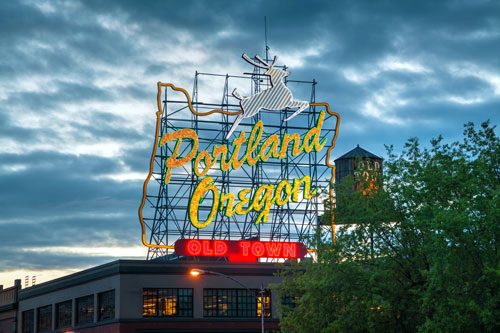
eLab Accelerator 2017
Renewable Resilient Power for Portland (R2P2)

Project Objective
Design a replicable, neighborhood-scale planning process for identifying and prioritizing sites for solar plus storage (s+s) valued by stakeholders.
Develop the business case for public sector investment in solar plus storage, including identifying market barriers and solutions and ways for s+s to provide value in times of non-emergency.
Position Portland to apply for grant funding to support s+s installations.

Team Members
- Andria Jacob, Senior Manager, Energy Programs and Policy, City of Portland Bureau of Planning and Sustainability (BPS)
- Jonna Papaefthimiou, Planning, Policy, and Communications Manager, City of Portland Bureau of Emergency Management (PBEM)
- Tim Lynch, Senior Policy Analyst, Multnomah County Office of Sustainability
- Amy Nagy, Project Manager, Portland Development Commission (PDC)
- David McClelland, Program Manager - Solar, Energy Trust of Oregon
- Erik Anderson, Strategic Manager - Renewable Energy and Emerging Technologies, Pacific Power
- Brian Spak, Manager, Customer Energy Solutions, Portland General Electric
- Kristina (Stina) Brock, Senior Director, Global Utility and Grid Solutions, Sunverge

Project Description
Portland is at risk of a major earthquake in the next 50 years that could take the electric grid off-line for as long as four months. The City’s Mitigation Action Plan (MAP) prioritizes actions the City can take to protect people and infrastructure. Of nine priority actions in the MAP, three call for solar plus battery storage (s+s) systems. We see Accelerator as the catalyst for the City and its public sector and utility partners to implement and build on actions listed in the MAP, driving customer-sited s+s to prepare for disaster and making the grid more flexible in everyday situations.

Progress Made to Date (pre-Accelerator)
As a result of Accelerator 2016, Energy Trust of Oregon reached out to the City of Portland BPS to seek potential pilot sites for City-owned s+s installations. This inquiry catalyzed BPS’s interest in and attention to resilient power. In mid-2016, BPS worked with city emergency management officials to prioritize including s+s action items in the MAP. Energy Trust and BPS collaborated on developing the language that eventually got incorporated.
In fall 2016, BPS, led by Andria Jacob, convened the Resilient Power Work Group (RPWG) to support implementation of the s+s action items identified as high or medium priority in the MAP. The RPWG consists of the Portland Bureau of Planning and Sustainability, Portland Bureau of Emergency Management, Multnomah County Office of Sustainability, Energy Trust of Oregon, Oregon Department of Energy, Pacific Power and Portland General Electric. The group has drafted a charter and has established some specific activities to achieve over the next few years.

Background Information

Accelerator Results
As a result of Accelerator, the R2P2 team agreed to accomplish the following activities over the next year (by April 2018): - Continue to convene the R2P2 working group monthly. - Conduct an in-depth analysis of all the Basic Earthquake Emergency Communications Nodes (BEECNs) according to criteria developed at Accelerator. - Create a short list of 3-6 sites to begin site host engagement. - Explore funding options for three sites. Within 12 months, R2P2 expects to have selected three neighborhood sites for solar + storage deployment and to have funding identified for each.